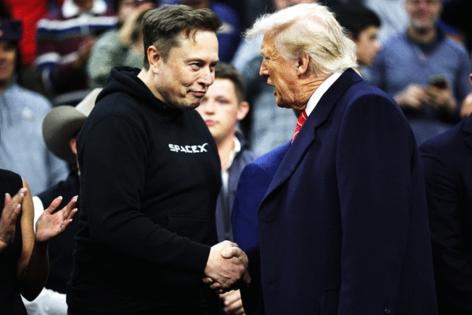Commentary: The care and feeding of a superpower
Published in Op Eds
The Department of Government Efficiency, DOGE, led by an unelected billionaire and supported by the Donald Trump administration, continues its bulldozer approach to our federal government.
As we careen forward, an essential food for thought is an awareness of the global and historical perspectives that underscore how our current leaders' strategies align with a playbook for the final chapter of previous global powers.
When we think of global dominance, we often think of military strength and the size of a superpower’s budget. What we think less of is the importance of perception or the significance of the cultural aspects of power.
The USAID spreads the impression of a peaceful and protective United States, dispersing resources and building a global community with the U.S. at the helm. President Kennedy began the USAID in 1961 with an executive order. Research shows that USAID has continuously had bipartisan support and a tremendous impact, makes up less than 1 percent of our budget, and is a major player within the United Nations Developmental Program.
Military and financial power alone does not make a global power. To preserve a respectable image, we need soft power. We need to be viewed as morally good, akin to what public intellectual Slavoj Žižek calls global capitalism with a human face. The United States has leaned into this strategy. We are a military giant, and still, people worldwide view us as democratic and politically stable.
Sociologists have long shown the importance of this balancing act. When antagonistic forces are the foundation of a system, something must entice those with less power to cooperate or submit rather than revolt. Workers who receive benefits are less likely to strike. Those living in proximity to the toxic outputs of oil refineries are less likely to critique the company when it also invests in healthcare and education for the community.
The United States grew into its role as a world power politically and economically, and, like the British, Dutch, and Spanish empires before it, may be destined to lose this status eventually. In The Long 20th Century, the late scholar Giovanni Arrighi analyzed empires and how they transition. Their decline follows a pattern. One part of this order is that an empire’s ambitions exceed its tangible resources, and over-extension predates its decline. Trump’s colonial tendencies, for example, when he states he wants to take over Greenland, The Panama Canal, and Gaza, echo exactly the overextending vibe of world leaders pre-collapse.
We are the emperor who quickly drops clothing. It’s inefficient to waste food, medical trials, people, or allies. As a superpower, appearing secure, functional, and stable is valuable. The United States is seeking expansion, and at the same time, its leaders are dismantling its systems internally. And these things matter. We don’t live in a peaceful world, and global leaders vie for power. There are those who would appreciate the internally initiated demise of the United States.
To be sure, the waning of U.S. global dominance is likely inevitable. The contradictions of Trump and Musk’s decisions to eliminate USAID inefficiently and dismantle the federal workforce while simultaneously making large power grabs, such as seeking additional territories and mineral rights, could speed up this descent.
There may be nothing that can make a superpower become self-reflective enough to be sustainable. It is unlikely that the Trump administration will reinstate robust foreign aid and federal workers nor invest in sustainability-oriented policies such as the Green New Deal.
But we live in an era where we are increasingly aware of Adrienne Marie Brown’s emergent strategy. What if our leaders could turn towards more evolved skills and sustainable actions, such as prioritizing the care of people and our planet overfeeding a no-boundary endless treadmill of greed chasing? Perhaps the asymmetry inherent to empires is not meant to last, but perhaps humanity can. We need leaders who understand that global sustainability, and thus solidarity, are the best renewable resources.
The global political economy is not a high-stakes card game. It is the context and backbone of our only shared reality. And it’s time for its parameters to evolve from a dog-eat-dog mentality to a regenerative one. We need leaders who value non-alternative facts and our future, who believe in diversity, equity, and inclusion, and who trust our scientists.
We need a government that can imagine and work towards a better world where education is broadly funded, federal employees keep their jobs, we appropriately tax our wealth hoarders, and at our core, we strategize for liberation for all rather than domination for some.
Our world's systems may not be a card game, but it would behoove our leaders to understand not only the art, but also the science and history of their dealings and the systemic risks of bad faith plays.
____
Megan Thiele Strong is a Sociology professor at San José State University, a Public Voices Fellow at The OpEd Project, and a member of the Scholars Strategy Network.
_____
©2025 The Fulcrum. Visit at thefulcrum.us. Distributed by Tribune Content Agency, LLC.




























































Comments